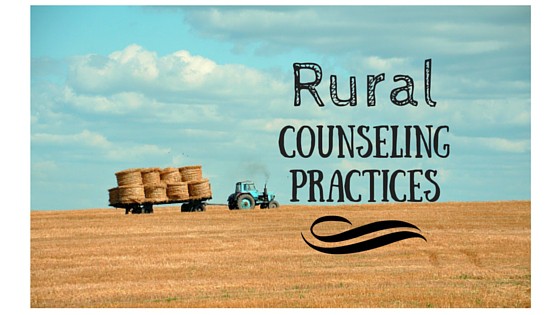Rural Counseling Practices
 As a therapist in a private practice that works in both the urban and rural worlds, I have noticed there are some interesting differences between working with rural and urban clients. Having a private counseling practice in a rural community does require some understanding of the culture of the rural community. As I have read the blogs of other private practice consultants and also what is in the research literature there are some interesting differences in both clinical and business practices that have to be considered. The research shows that there is an over-lap of ethics and how differing business models for counseling private practices come into play.
As a therapist in a private practice that works in both the urban and rural worlds, I have noticed there are some interesting differences between working with rural and urban clients. Having a private counseling practice in a rural community does require some understanding of the culture of the rural community. As I have read the blogs of other private practice consultants and also what is in the research literature there are some interesting differences in both clinical and business practices that have to be considered. The research shows that there is an over-lap of ethics and how differing business models for counseling private practices come into play.
Where I am located, Northeast Tennessee, is by far a unique region of the country. Firstly, I am in the South with all the culture and values that go with that. Secondly, I am in the Appalachian region with a whole other set of cultural norms and values. The people from Appalachia tend to be very conservative politically and are typically evangelical/fundamental Christians. There is also a sense of being very close-knit and family oriented. Who you are kin to matters in Appalachian culture. Economically, Appalachia is still predominantly rural and has some of the highest rates of poverty in the country. Socioeconomically it still lags behind the rest of the country. But the truth is, Appalachian culture is not too different from many other rural cultures.
So how do all these factors affect the way a counselor might run their private practice? Would this be true of most rural private practices?
In a 2010 article by, Jonathan Rollins in Counseling Today titled, Learning the ropes of rural counseling, Rollins points out that we all learned the importance of knowing about cultural differences in graduate school. And we generally tend to think first about ethnic cultural differences. But the truth is that there is definitely a distinct “rural culture” in most states. In a rural private practice, it is really essential that counselors and therapist know and understand their local culture, not only from a clinical standpoint but also a business standpoint.
Here are a few practical considerations for private counseling practices in rural areas:
Know your demographics
When thinking about the potential clients that you might be serving in rural areas, it is important to understand the socioeconomic and age demographics of your area. For example, what is the population of your geographic area and where do most people work and/or have their occupations? Are they farmers, miners, or work in local retail, etc.? We generally think of rural areas being primarily agrarian, but that is not always the case. In my area of the country, coal mining has been a large industry. So there are a lot of people working for businesses that support coal mining. But by knowing all of this data, you can get a better picture of what the daily lives of potential clients might be like. You can go to census.gov and get tons of information about your local area.
Also knowing the demographics can help you know what to expect about what fees to charge and your pricing on that. A therapist practicing in a rural area is probably not going to be able to charge $200 a session. In general, the cost of living in rural areas is lower, so you will need to adjust your fees accordingly. I would also say, being on insurance panels might be more advantageous for a rural practice compared to an urban practice. Being on insurance panels does make a therapist more appealing to a larger pool of potential clients. There are some definite downsides to being on insurance panels, but in rural areas in might be good business decision to consider. More on this in the blog post I did on this topic.
Networking and marketing needs to be more hands on and broad
The internet and social media is changing this some for rural communities. Even in rural areas people do have internet access! Nonetheless, being able to make personal contacts is probably more effective in rural areas. Getting to know and introducing yourself to local pastors and clergy is a good place to build referrals. Also being known to local medical clinics and the doctors working there. Also, recognize that your geographic area is going to be much larger. In general, I would say try to market in at least a 50 mile radius, maybe larger. That way you draw from a greater volume of people that might need your services.
Learn to be a good “generalist” therapist
Many times in rural areas there are just not that many therapists and counselors available. So being able to address and know about several different issues is good. What it requires is the counselor staying current on their reading and leaning about things. In many ways it is like being a “country doctor”. You have to know how to treat a wide variety of less serious issues and also know when to refer. It is a good practice also, to develop a good referral list/network of therapists you can refer to when you get cases that you feel you would not be as effective with. Load yourself up with resources.
Network with other therapists
Get to know and try to get with other therapists that might be in your area. Rural practices, and even solo practices for that matter can get lonely. Even if there are just a few therapists in an area, network with them and get to know them and their areas of expertise. I guarantee, they will be glad to have some relief and other therapists they can refer to when they get overloaded!
Understand that dual relationships are different in rural and small communities.
In rural and small communities, knowing a lot of the people living there just goes with the territory. It is what makes rural living so unique. Everybody knows everyone! So it would not be unusual for clients to be people that you either do business with or know socially. It kind of goes against most of our ethical standards to have dual relationships. However, in rural communities it sometimes cannot be avoided. So one of the ways to address this is to be clear on the front end with clients about confidentiality and that you not discuss any of their counseling issues outside of sessions. For example, with my practice it is not unusual for me to see people that I also happen to go to church with. I always set a very clear boundary with them that I will not discuss anything with them while we are at church functions or after services. In other words, don’t pull me aside to talk about what we talked about in session. For the most part, people understand this and are very happy to know that I am protecting their confidentiality. And when it comes to business practices, never barter or offer your services in exchange for someone else’s services. (I think the ethical codes are pretty clear about that anyway). But in rural communities, that issue does come up.
Get involved in the community
People choose to live in rural communities for any number of reasons. But would say that the number one reason that people live in a rural community is because they have a connection to that community. It is where they are from. Rural communities not only provide physical space and some solitude, but they also provide deep family and peer connections. There is a sense of solidarity that people experience in rural communities. There is the potential to truly know your neighbors and come to depend on them in ways that a person living in an urban area might miss out on. There might not be as much formal entertainment in terms of restaurants, movie theaters or other amenities of the city. But what you do have is each other and the relationships you can form.
It is possible to have a thriving private counseling practice in a rural setting. It can be very rewarding and give a therapist the opportunity to serve people in a unique and much needed way. Mental health services in rural communities are sometimes very hard to come by. It does require the desire to have a different lifestyle and relationships outside the session with your clients. And this can be so rewarding!
 By L. Gordon Brewer, Jr., MEd. LMFT – Gordon is the President and Founder of Kingsport Counseling Associates, PLLC. He is also a consultant and business mentor at The Practice of Therapy.
By L. Gordon Brewer, Jr., MEd. LMFT – Gordon is the President and Founder of Kingsport Counseling Associates, PLLC. He is also a consultant and business mentor at The Practice of Therapy.



